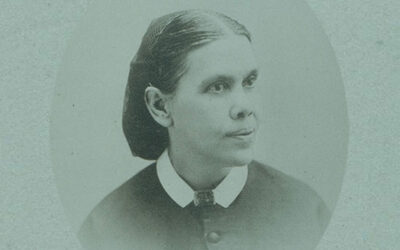Sometimes, life is just plain hard. There’s no way around it. So would thinking about things differently really change anything?
Our perspective on life, and everything it throws at us, affects more than we’re even aware of.
Think of perspective as the windshield through which you view life. If it’s dirty or damaged, it’ll distort your perception. And if we get so used to driving with a dirty windshield, we might forget what it looked like when it was clean.
Changing your point of view is essential to facing challenges and getting through hard times. It makes you a more resilient person as you realize that you’re not facing everything alone—God is “with you wherever you go” (Joshua 1:9, NKJV).
So let’s learn what we can do to establish a healthy perspective:
- Why your mindsets matter
- How to change your perspective
- 5 mindsets for a positive perspective
- Habits to support your enriched perspective
And before we can even consider shifting our outlook on life, it helps to have a reason for doing so. Let’s be clear on why we’re focusing on the way we see our world.
Why is it important to change your perspective on life?
Changing your point of view helps you handle the curveballs life throws at you.
It all boils down to your mind, and its power over your body’s ability to handle stress.
Adam Aréchiga, a doctor of psychology at Loma Linda University, discusses this connection. He points out that stress is about “personal perception.” What one person views as stressful may not be stressful to someone else. We all see things from a different angle.
Dr. Aréchiga teaches that managing stress requires changing how we think about something and learning to accept what we can’t change.1
And he’s not alone in his views.
A Stanford report called “Your Powerful, Changeable Mindset” shows that the way we view stress impacts whether the stress affects our health in negative ways.
It quotes Dr. Jacob Towery, a clinical instructor in Stanford’s department of psychiatry: “The exciting news about mindsets is that they are absolutely changeable.”2
So let’s figure out how we can do just that.
How do you change your perspective?
Changing perspective involves changing the way we process situations and life in general. It consists of the power of choice, because no one else can do it for you.
However, that doesn’t mean you have to do it all on your own. There is divine help from God, and His Holy Spirit, working through His Word—the Bible. We can use the principles of Scripture to guide our mindsets.
So what does that look like?
We can’t control the negative thoughts that come into our minds. But through the agency God gives us, we can choose whether to allow those negative thoughts to stick around.
If we decide that we don’t want a thought, we can counter that thought and replace it with a truthful thought—like a passage from Scripture—instead.
This process is called “reframing.”
As we reframe our thoughts in light of God’s Word, we are creating new neural pathways in our brains that grow stronger as we repeat those thoughts over and over again. New habits of thinking develop.
For example, let’s think about a situation we all associate with sadness and difficulty.
Let’s say you’re facing cancer and having to deal with the severe effects of chemo. You may have the underlying belief that you don’t deserve good things in life. Thus, for you, the cancer diagnosis is another confirmation of this self-talk.
The result?
Your outlook on life is bleak. You feel depressed and discouraged with little motivation to live.
(And…you might not even be fully aware of the fact that you think this way. But it’s become an underlying framework of your mindset.)
Enter Scripture. God’s Word reorients us and helps us accurately view reality—even when going through a difficult situation like cancer treatment.
That’s why we’ll explore five mindsets in Scripture that can change our outlook.
What are 5 mindsets for a positive perspective?
The Bible offers five key mindsets that will help us see the bigger picture of life when faced with challenging things. For each of the following, we’ll look at Bible verses that can help us reframe with positive thoughts for a new perspective. You can use these passages as affirmations.
1. Contentment

Photo by Nikola Johnny Mirkovic on Unsplash
One of the biggest causes of worry is discontentment. It’s like a nagging feeling that something’s missing. We still need something…even if we’re not sure exactly what.
We often feel discontent when we tell ourselves we’re missing out on something. And so, we keep reaching out for more because we’re dissatisfied with our current situation.
Paul tells us that “godliness with contentment is great gain. For we brought nothing into this world and it is certain we can carry nothing out” (1 Timothy 6:6–7, NKJV).
So, he advises us to be content—to count ourselves blessed if we have food and clothing.
And he gives us his own example when he says:
“I have learned to be content in whatever circumstances I find myself. I know how to make do with little, and I know how to make do with a lot” (Philippians 4:11–12, CSB).
Another cause of discontentment is comparing ourselves with others.
We run into so much stress trying to be like so-and-so, trying to measure up to societal expectations, and beating ourselves up if we don’t.
Again, the Bible tells us that this kind of comparison is unwise and unhelpful (2 Corinthians 10:12).
Being content with ourselves and our current circumstances frees us from the anxiety of trying to be someone else or do or get more.
Then we can relax and enjoy the present. We can pause to appreciate the blessings that today brings. And we might just realize that our situation is not as bad as we thought it was!
Note: Contentment is not the same as complacency. It’s not a feeling that you don’t need to improve your situation.
Instead, you realize where you are in your journey, appreciate how far you’ve come, and continue striving for more.
But remember that every step of that journey is precious and has its lessons. And that includes the step you are currently in.
2. Gratitude
Gratitude is an attitude of thankfulness.
It’s seeing the blessings in your situation and the gift in the people—family members and friends—who surround you in your journey. It’s an outward focus that leads us to bless and help others.
And most of all, it’s appreciating the privilege of being in God’s special care. We thank Him for providing for us, protecting us, and loving us.
Even when things are hard, we can still trust that He’s in charge and that we’ll understand His larger plans in time.
Paul advises us to be thankful when faced with anxiety:
“Be anxious for nothing, but in everything by prayer and supplication, with thanksgiving, let your requests be made known to God. And the peace of God, which surpasses all understanding, will guard your hearts and minds through Christ Jesus” (Philippians 4:6–7, NKJV, emphasis added).
So, whenever you start worrying about the future, block out even just five minutes to do nothing else but intentionally think about the good things you can be grateful for. Think of God’s blessings in your life and how He’s brought you through hard times.
Here’s an exercise that psychologist Dr. Aréchiga encourages his patients to do. He tells them to think about a positive resource in their life—a person, place, thing, or activity that gives them great happiness. Then, he asks them to visualize that resource with as many sensory details as possible.
Visualizing the pleasant details intensifies it in our memories and makes it easier to fortify positive associations. It also allows the nervous system to reset and move out of a stressful state.
This can actually be quite empowering: Each time you consider how grateful you are for someone or something in your life, you’re increasing your capacity to handle hard things.
3. Humility
Humility is having a modest view of yourself. It’s knowing you’re not more important than others and at the same time not any less important. In relation to God, it means you submit to His wisdom—trusting Him and allowing Him to direct your life.
(Note: Humility does not equal self-loathing or self-deprecation. True humility still acknowledges your inherent value as a human being.)
The opposite of humility is pride, or having an inflated ego and thinking of yourself as better or more important than others—what is often described as someone being “full of themselves.”
But oddly enough, pride is a notorious cause of worry.
It often stems from low self-esteem and leads to conflict with others because proud people feel the need to prove themselves.
Yet the Bible makes it clear that pride will lead to our downfall (Proverbs 11:2; 16:8)—resulting in what we fear most.
But for the humble, the Bible promises a better future (James 4:6).
Solomon, the wisest man who ever lived, observed the outcomes of both proud and humble people and concluded, “A person’s pride will bring him low, but a humble spirit will obtain honor” (Proverbs 29:23, NASB).
And Jesus is so willing to teach us to be humble.
All we need to do is go to Him. He welcomes us by saying, “Come…and learn from Me, because I am lowly and humble in heart, and you will find rest for your souls” (Matthew 11:28–29, CSB).
4. Courage
Courage is the quality of facing the unknown even when you feel fearful or uncertain of what such a step will lead to.
It’s not a blind impulse by any means. Courage often involves planning and strategy to reduce risks and mistakes.
But the courageous are willing to go through with something even if it’s outside their comfort zones.
And it’s not that the courageous don’t feel fear or stress. But as psychologist Kelly McGonigal points out, they choose to see that stress as helpful—it’s the means of propelling them forward and helping them get through the tricky situation. As a result, their bodies handle the stress better, and they don’t experience the negative effects as much.
So what are some affirmations from the Bible for having a mindset of courage?
Look at God’s words to Joshua, who was called to lead the Israelites into the Promised Land:
“Be strong and courageous. Do not be frightened, and do not be dismayed, for the Lord your God is with you wherever you go” (Joshua 1:9, ESV).
Also, think about how David encouraged his son Solomon to accomplish the daunting task of building the temple. He told him very similar words:
“Be strong and courageous and do it. Do not be afraid and do not be dismayed, for the Lord God, even my God, is with you” (1 Chronicles 28:20, ESV).
You may be in a situation where you need to make a decision or take action, but you are afraid of the outcome. Or you may even be afraid of the process itself.
God’s word for you, too, is “be strong and courageous.”
He promises to be with you every moment so you can confidently say, “I can do all things through Him who strengthens me” (Philippians 4:13, ESV).
Every time you find fear creeping in, take courage by reminding yourself that God has not given us a spirit “of fear but of power and love and self-control” (2 Timothy 1:7, ESV).
5. Hope

Photo from Unsplash
Hope is the opposite of worry. It’s the anticipation or expectation that something good will happen—sooner or later.
People with hope have what author and psychologist Carol Dweck calls a “growth mindset” rather than a “fixed mindset.” They choose to expect and work toward the best possible outcome, believing that they can develop and improve instead of staying stuck.
If you find yourself at a standstill, choose to see the silver lining in your situation.
Easier said than done, though, right?
But it has to start there. Make a decision to start looking for the good in things, and over time it will become more of a habit. You’ll imprint a new pathway in your brain.
And as you strive toward a more hope-filled perspective, you can move beyond your current situation and grow into the person you want to be. Why? Because “He who promised is faithful” (Hebrews 10:23, NKJV).
You can look ahead knowing that God is in charge of your future. He declares:
“I know the plans I have for you…plans for your well-being, not for disaster, to give you a future and a hope” (Jeremiah 29:11, CSB).
What kind of habits support a healthy perspective?
As we’ve seen, our thoughts—or self-talk—play a significant role in our perspective. But the way we live also makes a difference. Wholesome and healthy habits will support brain function even as we change our outlook.
Dr. Neil Nedley, a Seventh-day Adventist physician and founder of the Nedley Depression and Anxiety Recovery program, highlights the importance of the following factors when it comes to mental health:3
- Proper nutrition from a diet high in plant foods
- A toxin-free environment
- Regular exercise
- Sunlight exposure
- Fresh air
- Rest and recreation
- Water
- A healthy community and social connections
- Brain-boosting music
By following these lifestyle measures, our minds can function at their optimum, and we’ll be more equipped to handle the hard things that come our way. We’ll more easily be able to adopt the biblical mindsets we’ve learned about.
For more detailed steps toward a stress-free lifestyle, read our page on 12 practical ways to overcome worry and fear.
Make a positive change today
Changing your perspective on life is not easy. It involves intentionally replacing negative thoughts with the truth of Scripture. It’s about exchanging:
- Discontentment for contentment
- Self-pity for gratitude
- Pride for humility
- Fear for courage
- Worry and stagnation for hope
These new mindsets, along with healthy habits to support them, will give you a positive attitude and make you resilient in the face of challenging circumstances. Even though life won’t be perfect, it will be meaningful and fulfilling.
And the good news?
God promises to help you in this whole journey. You can head over and read those promises here!
Choose an Online Bible Study
Want to keep learning? Find out more about Jesus, humanity, the plan of salvation, and how God loves you enough to sacrifice everything, just to give you a chance to choose Him.
Sometimes it can be hard to know where to start, that’s why we offer free, user-friendly, online Bible study options you can do anytime, anywhere, and at your own pace.
This online Bible school will take you through the major themes of Scripture, breaking down the Bible’s complex concepts into bite-sized pieces, which can lead you toward the answers of life’s more challenging questions.
- Arechiga, Adam, “Beating Anxiety: Effective Ways to Combat Stress in Our Daily Lives,” Loma Linda University Health, YouTube video, May 27, 2020. [↵]
- Primeau, Mia, “Your Powerful, Changeable Mindset,” Stanford Report, Sept. 15, 2021. [↵]
- Nedley, Neil, The Lost Art of Thinking (Nedley Publishing, 2011), ch. 11–19. [↵]
More Answers
What Does the Bible Mean When It Calls Jesus the Son of God?
When the Bible calls Jesus the Son of God it’s referring to His divinity. Learn what makes this so significant and what it has to do with salvation.
How Adventists View the End of the World
The end of the world is no fun to think about. But here’s how we can actually find hope and comfort in what’s to come.
What Is an Adventist Medical Missionary?
A medical missionary in the Adventist Church is someone who cares for the medical needs of people as a way of showing the love of Jesus. They may travel to another country, or even just serve in their hometown.
Is the Seventh-day Adventist Church Protestant?
Learn how the beliefs of the Seventh-day Adventist Church align with the “5 solas” of Protestantism.
The True Events Surrounding the Birth of Jesus
Jesus’ birth involved many strange events: a pregnant virgin, a stable birth, angels appearing to shepherds, and wealthy visitors. These help us understand His supernatural yet incredibly humble life.
Are Seventh-day Adventists Evangelicals?
According to its origins and definition, evangelicalism is about following Jesus and the Bible and sharing the Gospel through the way we live our lives. Adventists wholeheartedly harmonize with these principles.
Could Anything Keep Me from Becoming an Adventist?
We are each saved through Christ. But when it comes to church membership, are there certain beliefs or expectations to become an Adventist?
Do Seventh-day Adventists Have “Rules”?
We uphold principles we believe will help us maintain a closer relationship with Jesus and His Word. Learn how these principles guide Adventist lifestyles.
Your Comprehensive List of Ellen G. White’s Visions
Ellen White—an author, health-reform advocate, Bible scholar, and one of the most influential founding figures of the Seventh-day Adventist Church—was blessed by the Holy Spirit with the spiritual gift of prophecy (1 Corinthians 14; Romans 12:6-8). During her lifetime, she received direct guidance and inspiration from God in several different ways.
Do Seventh-day Adventists Have “Rules” For Marriage?
Around the world, many cultures and religions have various marriage traditions, expectations, or even rules when it comes to choosing a partner, planning the wedding, extended family logistics, or a number of other things.
An In-Depth List of the Prophecies About Jesus
How many prophecies of Jesus are in the Old Testament?
Can a Seventh-day Adventist Marry a Non-Adventist?
Yes. Seventh-day Adventists are not under any official rules that dictate who they can or cannot marry. This is a personal, life-altering decision between the couple and God.
What Adventists Believe About Alcohol and Tobacco Use
The Seventh-day Adventist Church has historically discouraged the use of alcohol and tobacco. Even before the church started in 1863, its leaders were realizing the negative effects of these substances.
What Does the Bible Say About Aliens and UFOs?
In 1938, aliens and UFOs were the subject of a mass prank. Around Halloween, Orson Welles performed a radio adaptation of H.G. Wells’ War of the Worlds. This ended up causing a panic throughout the United States—many people took it to mean that aliens had really attacked New Jersey.
What Do Adventists Believe About the Authority of the Bible?
Learn how one really old book (the Bible) is the sole foundation for all Seventh-day Adventist beliefs.
Is the Soul Immortal? Exploring What Adventists Believe
Based on the way the Bible describes humanity in comparison to God and angels, Seventh-day Adventists believe souls are not something you have, but something you are.
Jewelry—Why Do Many Seventh-day Adventists Choose Not to Wear It?
If you walk into a Seventh-day Adventist church service, you might notice that many people aren’t wearing earrings, bracelets, necklaces, or sometimes even wedding rings.
How the Bible Defines Love
Everyone talks about it, but do we really know what it means?
Why Does God Allow Suffering?
Poverty, genocide, a school shooting. A tsunami or earthquake that wipes out thousands of lives and leaves behind mourning family members.
International Pathfinder Camporee
Youth aged 10-15 in the Adventist Church’s global Pathfinder program look forward to the International Camporee every 5 years. This event brings together Pathfinders from around the world for exciting activities.
What Is Peter’s Ladder of Virtues, and How Does It Work?
Peter’s ladder of virtues is a phrase that refers to eight characteristics to be developed as a person grows in their relationship with Jesus Christ. It can be found in 2 Peter 1.
How Adventists interpret Bible prophecy
Bible prophecy conjures up a variety of emotions in people. For some, it feels exciting or mysterious.
What Counts as “Work” on the Sabbath?
God designed the Sabbath day to be a 24-hour period when we could pause and enjoy the goodness of His creation. We do this by putting aside our regular work so we can focus on spending time with Him and appreciating what He’s created (Exodus 20:8-11).
Moviegoers’ Guide to The Hopeful: The Facts Behind the Film
Learn where and when you can watch The Hopeful and how to get tickets. Already seen it? We’ll uncover the real story that inspired this film.
Protestant Reformation
Martin Luther. The 95 Theses. The Reformation. The Protest. Maybe you’ve heard these terms and wondered, What’s the big deal?
Ellen G. White’s Lasting Legacy
Ellen G. White is a well-known name among Seventh-day Adventists, but she also made an impact in many other parts of history, aside from being a co-founder of the Adventist Church.
Ellen G. White’s Challenging Health Journey
When it comes to lifelong struggles with health, Ellen White is no stranger. In fact, health challenges set the tone for her life early on—years before she was involved in co-founding the Seventh-day Adventist Church.
“What Was Ellen and James White’s Marriage Like?”
Ellen and James White, cofounders of the Seventh-day Adventist Church, met and married under somewhat unusual circumstances. But it’s a sweet story of partners in ministry becoming partners in life. And their married life continued to center on furthering the spread of the gospel together.
What Do Adventists Believe About the Mark of the Beast and 666?
It’s a popular topic, especially during tumultuous times. When everything around you feels chaotic, it’s easy to wonder about the end of the world, and topics like the mark of the beast, as mentioned in Revelation 13, can stir up uneasiness.
Didn’t find your answer? Ask us!
We understand your concern of having questions but not knowing who to ask—we’ve felt it ourselves. When you’re ready to learn more about Adventists, send us a question! We know a thing or two about Adventists.































